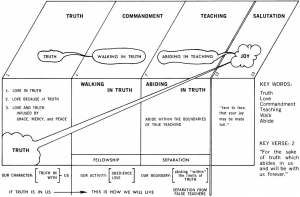Welcome to Day 1590 of our Wisdom-Trek, and thank you for joining me.
This is Guthrie Chamberlain, Your Guide to Wisdom
Bible Study – Conclusions and Affirmations – Meditation Monday
Welcome to Wisdom-Trek with Gramps! Wisdom is the final frontier in gaining true knowledge. Our mission is to create a legacy of wisdom, seek out discernment and insights, and boldly grow where few have chosen to grow before. Hello, my friend; this is Gramps; thanks for coming along on our journey to increase Wisdom and Create a Living Legacy Today is Day 1590 of our Trek, and it is time for Meditation Monday. Taking time to relax, refocus, and reprioritize our lives is crucial in order to create a living legacy. For you, it may just be time alone for quiet reflection. You may utilize structured meditation practices. In my life, Meditation includes reading and reflecting on God’s Word and in prayer. It is a time to renew my mind, refocus on what is most important, and making sure that I am nurturing my soul, mind, and body. As you come along with me on our trek each Meditation Monday, it is my hope and prayer that you, too, will experience a time for reflection and renewing of your mind.
We are continuing our series this week on Meditation Monday as we focus on Mastering Bible Study through a series of brief insights from Hebrew Scholar, Dr. Michael S. Heiser. Our current insights are focusing on accurately interpreting the Bible. Today let us meditate on:
Bible Study – Conclusions and Affirmations
· Insight Sixty-Five: Draw Both Positive and Negative Conclusions about What a Verse or Passage Teaches

Have you ever had a hard time putting precisely what you think into words? As a writer and student of the Bible, I’ve experienced that many times. It’s one thing to put the mental energy into studying Scripture. It requires digging into materials that help me try to understand a little bit about Hebrew and Greek grammar, reading background material, evaluating translation choices, that sort of thing. It is another thing altogether to be able to articulate what I’m finding. It can be frustrating.
The problem isn’t writing or speaking: it’s thinking with clarity. Here’s some of the best advice I’ve ever received about clear thinking: to think with clarity, deliberately think about things both positively and negatively. I have read that the best way to come to a clear statement of what you believe is to express yourself in affirmations (positive assertions) and denials (negative assertions).
The exercise of trying to say what you mean and following it by what you don’t mean has a way of separating the mental chaff from the wheat. For example, let’s take the statement in Romans 13:1 that says: Everyone must submit to governing authorities. For all authority comes from God, and those in positions of authority have been placed there by God.
You could say that you believe the verse teaches that every ruler on earth has been put there by God and should therefore be obeyed. But what exactly does that mean? Do you mean to say there are no exceptions? How could you justify one? Is the verse an assertion of God’s activity (God appoints every ruler) so that to disobey a ruler means rebelling against God’s choice? Maybe it’s just a statement of God’s sovereignty without crediting God for every last tyrant on the planet. Or perhaps Paul is merely expressing a wish (i.e., “everyone . . .”) since he knows people can t change their circumstances under the Roman Empire. If your government allows you to replace a ruler, does this verse forbid that? Why would you want to replace someone God put in charge? What is it that you believe about this verse? What don’t you believe?

An excellent way to sharpen your thinking and clarity in communicating to others is to carefully consider your Bible study results regarding what you think the text means and doesn’t mean. It may take an hour or two—or even weeks—of thinking, but the result will be precision and clarity.
· Insight Sixty-Six: Affirm the Obvious Without Extrapolating to the Unnecessary.

Have you ever seen one of those shows about how aliens built the pyramids? Or maybe you remember The DaVinci Code—how a Christian sect in ancient Egypt believed Jesus was married, and so that must be a truth that all the other Christians in the world suppressed.
It’s hard not to laugh, but many people can t see the logical flaw in these examples. They may not believe such things, but they can’t necessarily tell you what’s wrong. They’re classic examples of affirming an obvious truth and then extrapolating to unnecessary (and ridiculous) conclusions. In other words, the conclusion dramatically overstates the data. Yes, the pyramids are amazing. Archaeologists don’t know with absolute certainty how they were built. But because they can’t reproduce the feat doesn’t mean aliens from space came here and did it. Some people in the ancient church believed Jesus was married, but that belief doesn’t magically translate to reality.
I’ve talked about the need for logic and clear thinking in Bible study before. I’m not exaggerating when I say it’s a critical tool for Bible study. I’m also serious when I say that its absence is apparent all over the place. The examples above are funny, but these hit closer to home:
- Paul praised the Mosaic law, so we should keep the Law, observe the Sabbath,
and not worship on Sundays.
- Early Christians in Acts spoke in tongues, so every Christian needs to.
- Translations disagree, so we can’t know what the Bible says.
These statements observe something obvious and then propose a far-flung conclusion that extends well beyond the observation. Christians are not commanded to keep the Law, though Paul had something nice to say about it. Christians in Acts spoke in tongues, but there is no command mandating it for everyone. Translations do disagree, but not everywhere, and most disagreements are not contradictory.
When we study Scripture, we will see things in the text. Every conclusion we draw should have a direct line back into the text. If it doesn’t, our thinking goes beyond the text and is flawed.
Study this Book of Instruction continually. Meditate on it day and night so you will be sure to obey everything written in it. Only then will you prosper and succeed in all you do.
That is a wrap for today’s Meditation. Next week we will continue our trek on Meditation Monday as we take time to reflect on what is most important in creating our living legacy. Thank you for joining me on this trek called life. Encourage your friends and family to join us and then come along tomorrow for another day of ‘Wisdom-Trek, Creating a Legacy.’

If you would like to listen to any of the past 1589 daily treks or read the daily Journal, they are available at Wisdom-Trek.com. I encourage you to subscribe to Wisdom-Trek on your favorite podcast player so that each day will be downloaded to you automatically.
Thank you for allowing me to be your guide, mentor, and most importantly, I am your friend as I serve you through this Wisdom-Trek podcast and Journal.
As we take this Trek of life together, let us always:
- Live Abundantly (Fully)
- Love Unconditionally
- Listen Intentionally
- Learn Continuously
- Lend to others Generously
- Lead with Integrity
- Leave a Living Legacy Each Day
I am Guthrie Chamberlain….reminding you to ’Keep Moving Forward,’ ‘Enjoy your Journey,’ and ‘Create a Great Day…Everyday’! See you tomorrow for more daily wisdom!
Leave a Reply